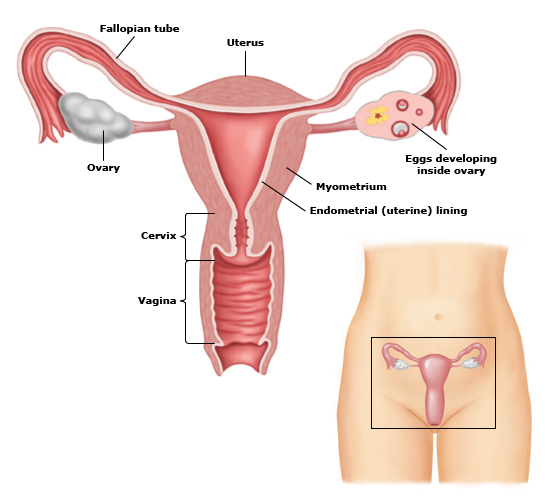Female Infertitlity
Infertility is “a disease of the reproductive system defined by the failure to achieve a clinical pregnancy after 12 months or more of regular unprotected sexual intercourse.”
Primary infertility
When a woman is unable to ever bear a child, either due to the inability to become pregnant or the inability to carry a pregnancy to a live birth she would be classified as having primary infertility. Thus women whose pregnancy spontaneously miscarries, or whose pregnancy results in a still-born child, without ever having had a live birth would present with primarily infertility.
Secondary infertility
When a woman is unable to bear a child, either due to the inability to become pregnant or the inability to carry a pregnancy to a live birth following either a previous pregnancy or a previous ability to carry a pregnancy to a live birth, she would be classified as having secondary infertility. Thus those who repeatedly spontaneously miscarry or whose pregnancy results in a stillbirth, or following a previous pregnancy or a previous ability to do so, are then not unable to carry a pregnancy to a live birth would present with secondarily infertile.
What is infertility?
In general, infertility is defined as not being able to get pregnant (conceive) after one year of unprotected sex. Women who do not have regular menstrual cycles, or are older than 35 years and have not conceived during a 6-month period of trying, should consider making an appointment their doctor. He may also be able to help women with recurrent pregnancy loss—2 or more spontaneous miscarriages.
Is infertility a common problem?
Also, about 12% of women 15–44 years of age in the United States have difficulty getting pregnant or carrying a pregnancy to term, regardless of marital status.
Is infertility just a woman’s problem?
No, infertility is not always a woman’s problem. Both men and women contribute to infertility.
Many couples struggle with infertility and seek help to become pregnant; however, it is often thought of as only a women’s condition. A CDC study analyzed data from the 2002 National Survey of Family Growth and found that 7.5% of all sexually experienced men younger than age 45 reported seeing a fertility doctor during their lifetime—this equals 3.3–4.7 million men. Of men who sought help, 18% were diagnosed with a male-related infertility problem, including sperm or semen problems (14%) and varicocele (6%).
What are the reasons a woman might have trouble getting pregnant? —
Four of the main reasons why some women cannot get pregnant include:
-
No ovulation or infrequent ovulation– Ovulation is the time in a woman’s monthly cycle when the ovary releases an egg into the fallopian tube. ‘Balanced’ Hormones control ovulation and if this balanced is disturbed, then infertility can arise. Pregnancy can occur if sperm fertilizes the egg as it travels to the uterus after ovulation. The peak fertile window and therefore the best time to have sex is 1 to 2 days before ovulation or on the day of ovulation. In some women, ovulation does not happen on a regular basis or at all.
-
Problems with the uterus or fallopian tubes – For example, some women have scar tissue in their fallopian tubes from past infections or surgery. This scar tissue can cause the fallopian tubes to be blocked. In the West Indies, infection is a leading cause of tubal disease.
-
Endometriosis – Endometriosis is a condition that can cause pain in the lower part of the belly. This can also lead to trouble getting pregnant. It can cause infertility in several ways including, difficulty with intercourse, a reduction of sex drive to chronic pelvic pain and the damage it can cause to the fallopian tubes and ovaries.
-
Older age – Once women get into their mid-to-late 30s, it can be harder to get pregnant, so it can take longer. Getting pregnant can be even more of a problem for women in the 40s.

When should I see a doctor? — If a woman and her partner are under the age of 35, doctors recommend that a man be tested if a couple cannot get pregnant after having unprotected sex for 1 year. At that time, both the woman and the man are often tested. Some couples are sometimes so anxious they are unable to wait one year. In that case, talk with your doctor. He or she might recommend that you have tests done sooner. If your partner is over age 35 and has not gotten pregnant after 6 months of trying, your doctor will start tests at that time.
But don’t be surprised if your doctor cannot tell you what is wrong. It’s not always possible to find out why a woman cannot get pregnant.
Is there anything I can do on my own? — If you are overweight, losing weight might help you become pregnant. Losing weight can also help you have a healthier pregnancy when you become pregnant. Eating right and exercising regularly will go a long way to helping your chances of conceiving.
What treatments are available? — Women who have trouble getting pregnant might choose to have one or more of the following treatments. You and your doctor should discuss which treatment to try first. Treatments can include:
-
A medicine called clomiphene (brand names: Clomid, Serophene) – This medicine improves the chances that ovulation will occur. Many times, doctors prescribe this treatment first. Your doctor will tell you how and when to take this medicine. He or she will also tell you when to have sex so the treatment has the best chance of working. If this medicine does not work after a few months, your doctor might recommend trying other medicines to help with ovulation.
-
Hormone shots – Hormone shots are often recommended if a woman does not get pregnant with clomiphene. Hormones improve the chances that ovulation will occur. Your doctor will tell you how and when to do this treatment.
-
Intrauterine insemination – For this treatment, a doctor uses a tube to place sperm directly inside a woman’s uterus. This is done right before ovulation. For some women, this treatment is combined with clomiphene or hormone shots to increase the chance of pregnancy.
-
In vitro fertilization, also called “IVF” – IVF is a procedure that is usually done if other treatments have not worked. It involves the following:
a. A woman gives herself hormone shots for a few weeks. These hormones get the ovary ready to ovulate.
b. Just before ovulation, the doctor uses a thin needle to remove some eggs from the ovaries. He or she does this through the vagina.
c. The eggs are put into a test tube with sperm so that the sperm can fertilize one or more eggs.
d. After 2 to 5 days, the fertilized egg or eggs are put in the woman’s uterus. Hopefully, one of the eggs will attach to the uterus and grow into a pregnancy.
e. IVF is usually done in women:
-
i. Whose fallopian tubes are missing or blocked
-
ii. With male partners who have too few sperm
-
iii. Who have not been able to get pregnant using other treatments
-
How will I know if a treatment is working? — Your doctor will do tests at different times during treatment to check if it is working. These tests can include blood tests and ultrasound. Ultrasound is an imaging test that creates pictures of the inside of the body.
Do treatments always work? — No. Treatments do not always help a woman get pregnant. The same treatment can work for one woman, but not another.
How do I decide which treatment to have? — Talk with your doctor about the benefits and downsides of the different treatments. To choose the treatment that is right for you, you might want to think about:
-
How well your doctor thinks the treatment will work
-
Cost of the treatment – Some treatments cost a lot of money. Health insurance does not pay for all types of treatments.
-
How long the treatment will take – Treatments might need to be done more than once to work. Getting pregnant can take months to years.
-
Side effects and downsides of the treatment
You should also talk with your doctor about other options for having children, such as adoption.
A woman can have a tough time making these decisions. You might find it helpful to talk to a counselor or go to a support group for people who are having trouble getting pregnant.
VIDEOS
ADDITIONAL RESOURCES
LOVE QUOTE OF THE DAY
"Love you will find only where you may show yourself weak without provoking strength."
 Resolve
Resolve
 CDC
CDC
 Barbados IVF
Barbados IVF
 HSG Test Video
HSG Test Video